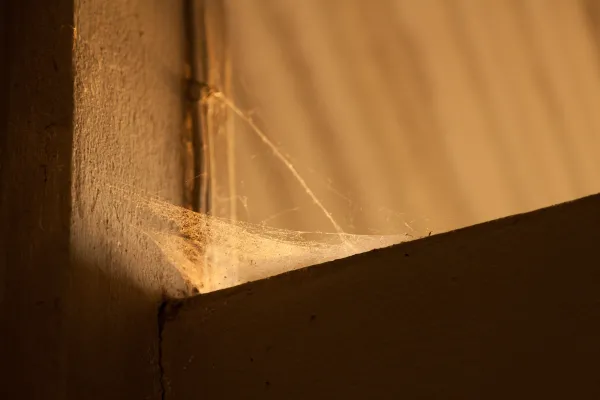
BLOGS
BLOG

Spider Webs in Your Home? Here’s Why Professional Dewebbing Matters
Walk into a room, catch a glint of silk in the sunlight, and suddenly—there it is. A spiderweb stretched across the corner of your ceiling or tucked neatly behind a lamp. While one little web might not seem like a big deal, spider webs aren’t just unsightly—they can be a sign of bigger pest problems lurking in your home.
This is where professional dewebbing comes in. More than just sweeping away sticky strands, dewebbing is a critical part of maintaining a clean, safe, and pest-free home. If you’re wondering why those webs keep popping back up and whether you should leave it to the experts, here’s everything you need to know.
What Exactly Is Dewebbing?
Dewebbing is the process of removing spider webs from both inside and outside your home. This usually includes ceilings, corners, window frames, eaves, porches, garages, and basements—basically all the places spiders love to spin their traps.
But here’s the thing: dewebbing isn’t just about looks. When done professionally, it’s part of a broader pest control strategy designed to not only clean up webs but also discourage spiders from returning. Think of it as housekeeping and pest prevention rolled into one.
Why Do Spiders Build Webs in Your Home?
Before we dive into why dewebbing matters, let’s look at why spiders are hanging around your home in the first place:
Food Source: Spiders spin webs to catch insects. If they’re building webs indoors, it means other bugs—like flies, ants, or gnats—are finding their way inside too.
Shelter: Quiet corners, basements, and attics are ideal spider real estate.
Breeding Grounds: Some spider species lay egg sacs inside webs, which can quickly multiply your problem if left alone.
So, when you see webs, it’s not just a spider problem—it’s a signal that other pests are around, too.
The Problems With Ignoring Spider Webs
It’s tempting to just knock webs down with a broom and move on, but here’s why ignoring—or only half-treating—the issue can cause bigger headaches:
Unsightly Appearance
Cobwebs make your home look neglected, no matter how clean you keep it otherwise. Guests notice them immediately, and so do you.
Allergens and Dust
Webs trap dust, dirt, and even pollen, which can aggravate allergies over time.
Spider Activity Grows
Removing one web doesn’t solve the problem. Spiders will simply rebuild elsewhere until the root cause—other pests and easy hiding spots—is addressed.
Potential Bites
While most spiders are harmless, some (like the black widow or brown recluse) carry venom that can be dangerous. You don’t want these types making themselves at home.
Egg Sacs Multiply the Problem
One egg sac can contain hundreds of baby spiders. Without dewebbing, you might be looking at a much larger infestation soon.
Why Professional Dewebbing Matters?
Sure, you can dust down a web or two. But professional dewebbing offers benefits that DIY just can’t match:
Thorough Coverage
Professionals know exactly where spiders like to hide, and it’s not always obvious. From high ceilings to outdoor eaves, they’ll cover every spot that could harbor webs.
Preventive Measures
Dewebbing as part of pest control isn’t just about cleanup. It’s about prevention. Professionals treat the areas where webs are removed, making it less likely spiders will return.
Safe Handling of Problem Species
If your home has venomous spiders, you don’t want to risk handling them yourself. Professionals have the gear and expertise to remove them safely.
Tied to Pest Control
Remember, spiders build webs because there’s food around. Pest control experts can identify and treat the insects attracting spiders in the first place.
Long-Term Results
DIY dewebbing is temporary. Professional dewebbing is strategic—it’s designed to break the cycle and keep your home cleaner and safer for longer.
Where Dewebbing Makes the Biggest Difference
Homeowners are often surprised at just how many webs professionals uncover during service. Common hotspots include:
Ceiling corners and crown molding
Behind curtains and furniture
Basements and attics
Garages and sheds
Outdoor lighting fixtures (attracted by bugs)
Porch ceilings and roof eaves
By tackling these areas regularly, you’re not only improving your home’s appearance but also reducing spider populations dramatically.
DIY vs. Professional Dewebbing
You might be asking, “Can’t I just grab a broom?” And yes—you can. But here’s the comparison:
DIY Dewebbing: Quick, temporary, often misses hidden webs, and doesn’t address the root cause.
Professional Dewebbing: Comprehensive, strategic, prevents regrowth, and is paired with pest management for lasting results.
Think of it this way: dusting away a cobweb is like cutting weeds at the surface. Professional dewebbing is like pulling them out at the root.
Tips for Homeowners Between Services
Even with professional help, you can take steps to make your home less appealing to spiders:
Seal cracks and gaps around windows, doors, and foundations.
Keep outdoor lights off when not needed (they attract insects, which attract spiders).
Store firewood away from your home.
Vacuum regularly, especially in corners and under furniture.
Reduce clutter in basements, attics, and garages.
These small actions make dewebbing efforts more effective and help you stay spider-free longer.
The Takeaway for Homeowners
Spider webs are more than just a spooky inconvenience. They’re a sign that pests are active in your home—and that it’s time to act. Professional dewebbing not only clears out unsightly webs but also keeps spiders from returning by addressing the bigger picture: insect control, prevention, and long-term protection.
Your home deserves to be comfortable, clean, and safe—not decorated with cobwebs.
How Valley Wide Pest Control Can Help
At Valley Wide Pest Control, we know that dewebbing is more than just clearing away cobwebs—it’s about creating a safer, healthier, and more comfortable home for you and your family. Our expert team doesn’t just remove webs; we address the root causes by treating the pests that attract spiders in the first place.
With regular professional dewebbing and pest control services, you can say goodbye to dusty corners, hidden egg sacs, and surprise spider sightings. Instead, you’ll enjoy the peace of mind that comes with knowing your home is protected inside and out.
Ready to take back your home from spiders? Call Valley Wide Pest Control today and let us help you keep your space clean, safe, and spider-free year-round.
© 2024 Valley Wide Pest Control. All rights reserved.

